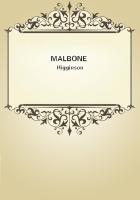The guests at the dinner were all GIadstonians and lamenting these differences and full of apprehension they might result in a split in the party. The earl asked me if we ever had such conditions in the United States. I answered: "Yes." Mr. Blaine, at that time at the head of President Harrison's Cabinet as secretary of state, had very serious differences with his chief, and the people wondered why he remained. Mr. Blaine told me this story apropos of the situation: The author of a play invited a friend of his to witness the first production and sent him a complimentary ticket. During the first act there were signs of disapproval, which during the second act broke out into a riot. An excited man sitting alongside the guest of the playwright said: "Stranger, are you blind or deaf, or do you approve of the play?" The guest replied: "My friend, my sentiments and opinion in regard to this play do not differ from yours and the rest, but I am here on a free ticket. If you will wait a little while till I go out and buy a ticket, I will come back and help you raise hell."The most brilliant member of Mr. Gladstone's Cabinet and one of the most accomplished, versatile, and eloquent men in Great Britain was Lord Rosebery. I saw much of him when he was foreign minister and also after he became prime minister. Lord Rosebery was not only a great debater on political questions, he was also the most scholarly orator of his country on educational, literary, and patriotic subjects. He gathered about him always the people whom a stranger pre-eminently desired to meet.
I recall one of my week-end visits to his home at Mentmore, which is one of the most delightful of my reminiscences abroad. He had taken down there the leaders of his party. The dinner lasted, the guests all being men, except Lady Rosebery, who presided, until after twelve o'clock. Every one privileged to be there felt that those four hours had passed more quickly and entertainingly than any in their experience.
It was a beautiful moonlight night and the very best of English weather, and we adjourned to the terrace. There were recalled personal experiences, incidents of travel from men who had been all over the world and in critical situations in many lands, diplomatic secrets revealing crises seriously threatening European wars, and how these had been averted, alliances made and territories acquired, adventures of thrilling interest and personal episodes surpassing fiction. The company reluctantly separated when the rising sun admonished them that the night had passed.
It has been my good fortune to be the guest of eminent men in many lands and on occasions of memorable interest, but the rarest privilege for any one was to be the guest of Lord Rosebery, either at his city house or one of his country residences. The wonderful charm of the host, his tact with his guests, his talent for drawing people out and ****** them appear at their best, linger in their memories as red-letter days and nights of their lives.
All Americans took great interest in the career of Lord Randolph Churchill. His wife was one of the most beautiful and popular women in English society, and an American. I knew her father, Leonard Jerome, very well. He was a successful banker and a highly educated and cultured gentleman. His brother, William Jerome, was for a long time the best story-teller and one of the wittiest of New Yorkers.
Lord Randolph Churchill advanced very rapidly in British politics and became not only one of the most brilliant debaters but one of the leaders of the House of Commons. On one of my visits abroad I received an invitation from the Churchills to visit them at their country place. When I arrived I found that they occupied a castle built in the time of Queen Elizabeth, and in which few modern alterations had been made. It was historically a very unique and interesting structure. Additions had been made to it by succeeding generations, each being another house with its own methods of ingress and egress. Lord Randolph said: "I welcome you to my ancestral home, which I have rented for three months."Though this temporary residence was very ancient, yet its hospitalities were dispensed by one of the most up-to-date and progressive couples in the kingdom. In the intimacy of a house-party, not too large, one could enjoy the versatility, the charm, the wide information, the keen political acumen of this accomplished and magnetic British statesman. It was unfortunate for his country that from overwork he broke down so early in life.
No one during his period could surpass Baron Alfred Rothschild as host. His dinners in town, followed by exquisite musicales, were the social events of every season. He was, however, most attractive at his superb place in the country. A week-end with him there met the best traditions of English hospitality. In the party were sure to be men and women of distinction, and just the ones whom an American had read about and was anxious to meet.
Baron Rothschild was a famous musician and an ardent lover of music. He had at his country place a wonderfully trained orchestra of expert musicians. In the theatre he gave concerts for the enjoyment of his guests, and led the orchestra himself. Among the company was sure to be one or more of the most famous artists from the opera at Covent Garden, and from these experts his own leadership and the performance of his perfectly trained company received unstinted praise and applause. Baron Rothschild had the art so necessary for the enjoyment of his guests of getting together the right people. He never risked the harmony of his house by inviting antagonists.













